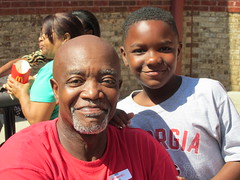A couple of presentations chimed for me at KM World yesterday.
Firstly a statement by David Snowden about how older staff and younger staff are more receptive to knowledge and ideas than middle-range staff, and how the retention and transfer of knowledge between these two age ranges may therefore be easier (he called it the grandparent effect).
Secondly a range of stories from Colin Cadas and Katarzyna Cichomska on the KAMP (knowledge acquisition and modelling process) at Rolls Royce, where young staff were trained to capture knowledge from people due to retire. In one case, a group of engineers with 30 years experience were retiring, and the KAMP project was run by a group of 19-year-old new hires, who had been given training in Knowledge elicitation and packaging.
There are several advantages to pairing up very experienced and very inexperienced staff in knowledge capture programs, rather than expecting the successor to the experienced person to capture the knowledge;
- There will be no rivalries between the experienced person and the junior. The junior is "no threat"
- The experienced staff will explain all the details, rather than making assumptions about what the juniors already know
- The juniors take the documentation load from the seniors
- The need to document means that the juniors are active participants rather than passive listeners. They learn better when they need to create the official record.
- When the experts check the documentation, this provides a second learning opportunity for the youngsters
- They leave the program with a training in KM techniques
- They leave the program with an "ownership" stake in the knowledge record, and are much more likely to refer to it and re-use it





No comments:
Post a Comment